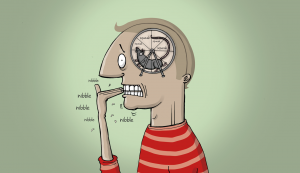
Tips for Anxiety
Racey mind? Sweaty hands? Low mood? Irritable? Inability to cope with stress? We’ve all been there, maybe more through this unfortunate time where it feels like the world has been turned upside down. In a world where stress is high and relaxation is hard to come by, it is important to know how nutrition can help our bodies keep up with the demands put on it and help us to deal with stress as well as possible.
What is happening in my body when I feel anxious?
The body is run on a variety of chemical processes, all fighting to keep us at balance but more often than not that balance tips onto one side of the scale more. People are in a constant state of “fight or flight” a system in us since our caveman days to help us run from the bear, except there is no bear and most of us are safe, but our minds race, struggling to keep up with life’s demands………bills, kids, relationships, work etc, causing this system to kick in and release stress hormones cortisol and adrenaline. While these are useful to help us from a threat, they can become a problem when activated in response to everyday stress tiring the adrenal glands and putting even more pressure on the body. Thoughts create the same chemical reaction as a physical threat and for some we can’t escape our thoughts so we must help the body to be able to regulate these stress hormones as much as it can.
What nutritional support can help my anxiety?
Magnesium
I like to call magnesium a hug in a cup (when in a liquid version) or a hug in a capsule if not ???? It has over 300 functions in the body, but mainly is a muscle relaxant. Magnesium helps the body by reducing cortisol levels. It also helps release GABA, the brains primary neurotransmitter that can help the body and mind to relax. While magnesium helps with stress, stress depletes the body of magnesium causing a viscous circle and so it is of utmost importance to keep stores adequate if possible.
L theanine
L theanine is an amino acid found in green tea, known as an antixylotic. Monks throughout the ages have taken L theanine to get into a meditative state. L theanine boosts levels of the calming hormone GABA as well as our other happy hormones serotonin and dopamine. By lowering levels of “excitatory hormones” it can help promote a sense of calm. It also enhances alpha brainwaves, those brainwaves associated with relaxation and that state of mind you experience when meditating or creating. These brainwaves also enhance relaxation, focus and creativity, help increase attention span as well as memory retention. L theanine’s main appeal is that it is relaxing without being sedating.
Vitamin D
Vitamin D is an extremely important vitamin that we get mainly from the sun, so naturally is a big deficiency in people in Ireland. It helps to make the happy hormone serotonin which is found to be in low levels in people with anxiety. It is also essential in the production of GABA, that relaxing neurotransmitter. Almost everyone in Ireland should be supplementing with Vitamin D especially during Winter, where it has been proven to help with that low mood state called Seasonal Affective Disorder.
B complex
B vitamins are used in the body for energy production and to support the nervous system. They also help nourish the adrenal glands; those glands responsible for producing our stress hormones. B vitamins are water soluble meaning we don’t store them in the body and they are particularly vulnerable to being excreted in times of stress, from intense exercise and after drinking alcohol, hence that tiredness and jittery feeling we all get after a heavy night out.
Fish oils
Fish oils contain a fatty acid called DHA, which is responsible for brain development and mental performance. This fatty acid can help with the production and regulation of neurotransmitters involved in mood support.
A blood sugar balancing diet is extremely important in people with anxiety. While we all like to reach for the chocolate when stress is high, this increases a spike in blood sugar, then causing a rapid drop causing the body to release cortisol to try to stabilise things. Eating little and often and having meals with slow releasing carbohydrates and protein can help stabilise blood sugar levels and help to control the release of stress hormones. Coffee can also be detrimental for people with high levels of anxiety as it releases adrenaline, yep that happy high you get from coffee is actually from an adrenaline release, which can cause levels of stress hormones to stay high and the ability to cope with stress to be lowered.
Moderate exercise can also help with anxiety by releasing happy hormones and slow-paced exercise such as yoga and Pilates, which encourage deep breathing and relaxation can help lower stress hormones. Practicing mindfulness and meditation is also a massive addition to helping the body cope with stress and brainwaves have been studied and shown to be in a much more calm state after these practices.
